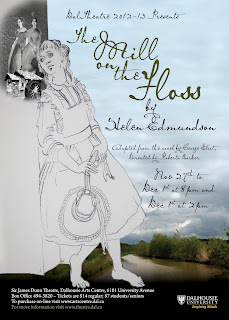The Mill on the Floss
 This
week, Dalhousie Theatre continues its 2012-2013 season with a performance of The Mill on the Floss, a drama adapted from George Eliot’s nineteenth
century novel. This universal coming-of-age tale will be brought to life by
Dalhousie students in their final year of the Honours degree acting program (as
well as a couple third year students); the set, period costumes and technical
support are also delivered by students pursuing degrees in technical
scenography and costume studies. Providentially, this production is directed by
Roberta Barker, an alumnus of Dalhousie University and a professor in her alma mater’s
theatre department. Arts East had the pleasure to catch up with this educator,
author, researcher, philogist and lover of the stage, whose directorial credits
include productions for Opera Nova Scotia, Windsor Theatre (Mount Allison) and
the Shakespeare Institute (Stratford-upon-Avon).
This
week, Dalhousie Theatre continues its 2012-2013 season with a performance of The Mill on the Floss, a drama adapted from George Eliot’s nineteenth
century novel. This universal coming-of-age tale will be brought to life by
Dalhousie students in their final year of the Honours degree acting program (as
well as a couple third year students); the set, period costumes and technical
support are also delivered by students pursuing degrees in technical
scenography and costume studies. Providentially, this production is directed by
Roberta Barker, an alumnus of Dalhousie University and a professor in her alma mater’s
theatre department. Arts East had the pleasure to catch up with this educator,
author, researcher, philogist and lover of the stage, whose directorial credits
include productions for Opera Nova Scotia, Windsor Theatre (Mount Allison) and
the Shakespeare Institute (Stratford-upon-Avon).
AE: What drew you to directing The Mill on the Floss?
RB: I have loved Helen Edmundson's theatrical
adaptation of George Eliot's classic nineteenth-century novel, The Mill on the Floss, ever since I first saw it in London in 1994
when I was myself a student. It is a very theatrically inventive, warmly human
adaptation of a timeless story about a brilliant and generous-spirited young
woman's coming-of-age in a society whose structures challenge her in many ways.
Because it is a play that explores the journeys of young people from childhood
to adulthood and their efforts to stay true to themselves in the face of huge
social and familial pressures, it is very suitable for a university community
and relates closely to the experiences of the young artists involved. At the
same time, it offers students the huge challenges of working with text from a
very different era (the nineteenth century) and with physical theatre
sequences. It is the epitome of a learning experience!
AE: What will audience members delight in when they
see the play?
RB: One of the most exciting aspects of Helen
Edmundson's adaptation of Eliot's novel is Edmundson's idea of giving the role
of the heroine, Maggie Tulliver, to three different actresses. Maggie is played
by one actress as a girl of 9, by a second one as an adolescent of about 15,
and by a third as a young woman of 19. At these different phases of her life,
we see her struggling to deal with her circumstances and expressing her passion
for life in very different ways. In the last part of the show, the three
different Maggies are often together onstage, expressing the character's
struggles and conflicts in a very direct, dynamic and theatrical way: a unique
kind of psychological storytelling for the audience to enjoy. Audiences will
also have the chance to see many of the actors embodying not just multiple
characters, but even natural events such as a huge flood. Finally, I feel very
confident that they will delight in the stunning multi-levelled set, intricate
props and gorgeous period costumes that our students and professors have so
painstakingly created to carry us into the world of a nineteenth-century rural
mill.
AE: As a professor in the department, is it a
highlight to be able to direct a student production?
RB: It is indeed a highlight to have a chance to
work with the students on productions. Our students' passion for and commitment
to their work is stunning. They spend countless hours each term in rehearsals
and in building sets, props and costumes. Their enthusiasm and dedication is
unmatched and makes them a joy to work with.
AE: As you and have been preparing for The Mill on the Floss, what have been some of the challenges or
highlights?
RB: Both a challenge and a highlight of working on
this show has been the way in which it combines large technical demands on the
actors, technicians and costumers with a deeply emotional story that is
fundamentally focused on very timeless relationships of love and family. The
students have to balance the demands of applying all the technical skills
they've been mastering over a number of years with the demands of working
through some very deep and even painful emotions. This can be a big challenge,
but it is also a great boon because, in the end, it's the technique that the
students have dedicated so much time to mastering that truly gives them a way
in to the emotion and to the characters. When that fusion happens, it's the
fruition of years of work for both the students and their expert instructors, and
it's tremendously satisfying to be part of it.~ By Michelle Brunet
The
Mill on the Floss ~ November 27 – December 1
Sir
James Dunn Theatre (Halifax)www.theatre.dal.ca


